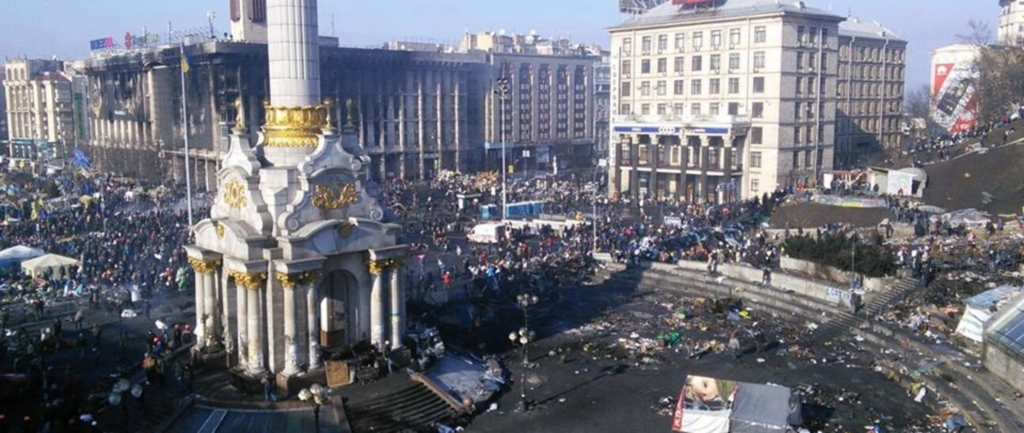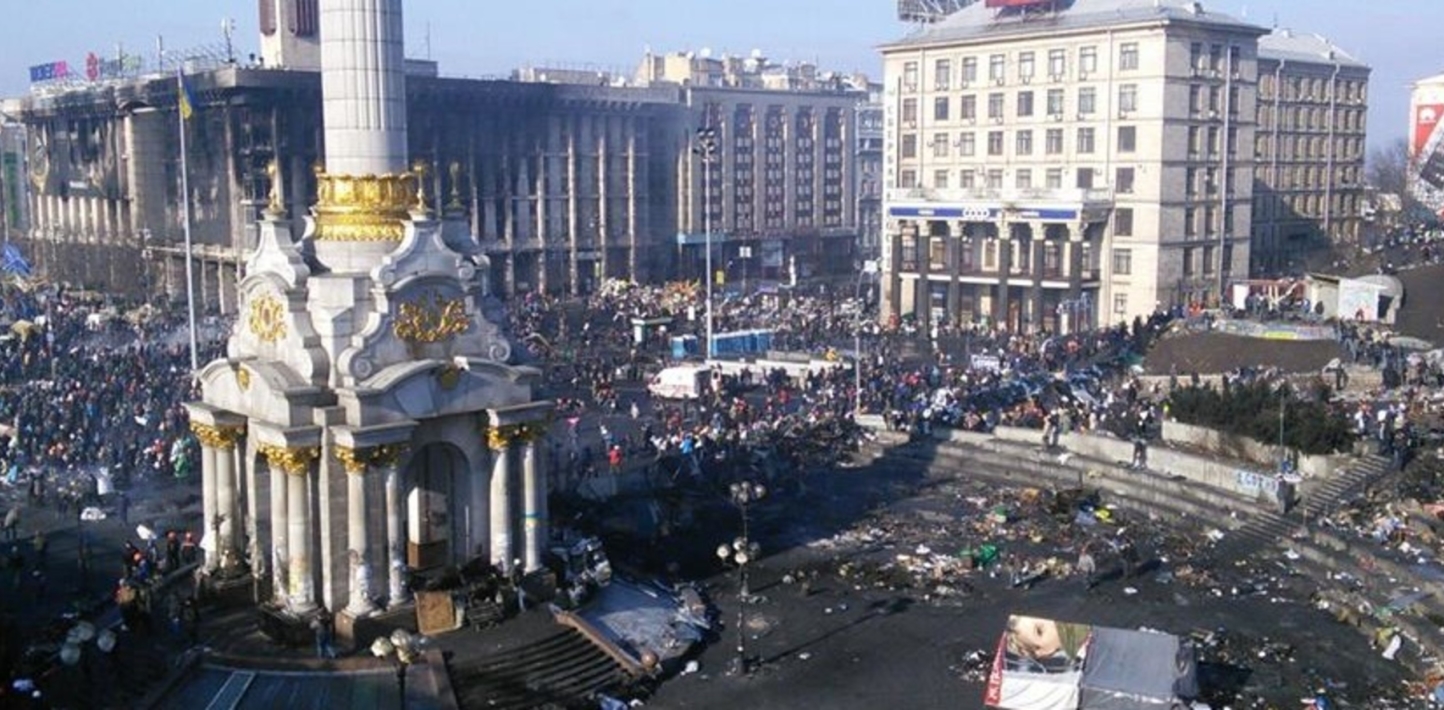By Tanya Mazur, Director of Amnesty International Ukraine.
The fall of the Berlin Wall signalled the start of seismic changes that continue to shake Ukraine. Two years later, the Soviet Union, of which Ukraine was a part, collapsed. At the time I was 10 years old and my growing up coincided with my country’s steps towards independence and the rule of law.
The 90s were a difficult time for independent Ukraine. Coming out from the totalitarian embrace of the Soviet Union, the country was plunged into economic and social chaos. I remember the empty shelves in the shops, the coupons which we had to cut out – a substitute for real money – with which we could buy sugar, washing powder and vodka. Several generations brought up in Communist times were trying to find their way in the new market economy. In Ukraine’s case, instead of the rule of law, the country woke up to the rule of racketeering and lawlessness.
The circumstances were not the best for the emerging civil society. On the other hand, the collapse of the Soviet Union heralded freedom and the possibility to enjoy civil and political rights – the dream of many dissidents. One of those who were persecuted under the Soviet regime was Amnesty International’s prisoner of conscience Miroslav Mironovych. He was so impressed with the support he received from Amnesty International’s members while in prison, so taken by the idea of international solidarity that he decided to set up a chapter in Ukraine. This became possible in 1991.
Since then Amnesty International Ukraine has campaigned tirelessly on the death penalty and other human rights issues. However, where positive changes were happening, these were often more to do with foreign policy – Ukraine’s declared “pro-European” choice – than with popular mobilisation.
Amnesty International could not generate significant support for its cause. Most Ukrainians were too caught up in the daily struggle of living in poverty to turn their attention to human rights issues.
But this was soon to change. In 2000, the murder of prominent investigative journalist Georgiy Gonzadze shocked the country. The allegations that the then President Leonid Kuchma had possibly ordered the murder triggered mass protests under the slogan “Ukraine without Kuchma” which ultimately led to the Orange Revolution in 2004.

I took part in that Revolution. I was thrilled by the sight of all those people who braved the snow, the cold, the possibility of police and even army brutality. I was elated by the prevailing atmosphere of tolerance and mutual respect and support.
Most of all I was struck by the way the media liberated itself from censorship and self-censorship. Journalists were turning their backs to state propaganda. Looking back, I think that freedom of expression was the main achievement of the Revolution.
However, subsequent governments failed to implement deep structural reforms.
Corruption continued to engulf Ukraine. Human rights were violated with impunity. Torture and other ill-treatment by police were and are rampant in places of detention – issues on which Amnesty International Ukraine has worked on with some success.
The organization was slowly but steadily growing and forming partnerships with other human rights groups in the country, fighting discrimination against refugees and against lesbian, gay, bisexual, transgender and intersex people.
There was hope that the Association Agreement with the European Union, scheduled for November 2013, would lead to long-needed reforms. But at the last moment, the Ukrainian authorities backed down, which provoked the peaceful protest — initially of students and young professionals and later joined by people from all walks of life — at the central Kyiv square the Maydan.
The EuroMaydan, as the protest became widely known, continued throughout the winter. At times it turned violent – protesters threw Molotov cocktails at the police. The response was swift and harsh: on 22 January snipers shot two protesters, and dozens more people were killed in the days that followed.
Amnesty International was at the forefront of calls for independent and impartial investigations into the abuses. “Human rights above everything” was one of the slogans of the protest.
While the hope was that EuroMaydan would change Ukrainian society once and for all, the wish for a happy ending has had a bitter twist. The ousting of then President Viktor Yanukovych was just the beginning of one of the most turbulent periods in Ukraine’s history. Russia occupied and, in March 2014, annexed Crimea. Pro-Russian separatism arose in the east of the country, and an armed conflict began which has already taken over 4,000 lives.
Now freedom of expression is again under threat, this time falling victim to the information war with Russia and pro-Russian activists in eastern Ukraine. Both sides trade allegations against the other of extrajudicial killings and other human rights abuses.
Both sides of the conflict have tried to impose their version of events and to silence any media that could offer an alternative point of view. There are cases of journalists beaten and abducted. Some have been killed, others disappeared without a trace.
In March, Oleksandr Panteleymonov, head of the First National TV Channel, was visited in his offices by Igor Miroshnichenko from the Svoboda (Freedom) Party and at least five thugs who beat him and forced him to write a resignation letter.
Pro-Kyiv media tends to present facts selectively, usually omitting any information presenting pro-Kyiv forces in a critical light.
However, there is no media blackout as such. There are media outlets that carry different points of view. As a representative of Amnesty International Ukraine I am a frequent guest in TV and radio studios speaking about human rights violations perpetrated by pro-Kyiv forces.
The platforms for informed debate are shrinking rapidly, and even on social media, polarised viewpoints clash with surprising ferocity. Freedom of expression is not respected for what it is — the right to hold and express opinions without interference in a debate where the arguments of the opponent can be taken into account.
Twenty five years after the fall of the Berlin Wall, 10 years after the Orange Revolution, Ukraine is again at a crossroads, being torn between its past and the future.
A new pro-European parliament was elected at the end of October, but many of the questions are still pending:
Will the new Ukrainian authorities promote human rights and the rule of law?
Will they enter in dialogue with civil society?
Will Ukrainians be ready to continue the fight for human rights for all?
I am afraid, for the immediate future, that the answer to some of these questions is “No”. Amnesty International is still heavily criticized when we speak out against human rights violations perpetrated by pro-Kyiv forces in eastern Ukraine. The authorities are, yet again, unwilling to act on our recommendations.
Our hope is that all is not lost. Now, unlike 25 years ago, civil society is thriving and social media is still a powerful force for change. We will continue to wave the flag of human rights in a bid to ensure that all the people of Ukraine enjoy the freedoms they deserve.


